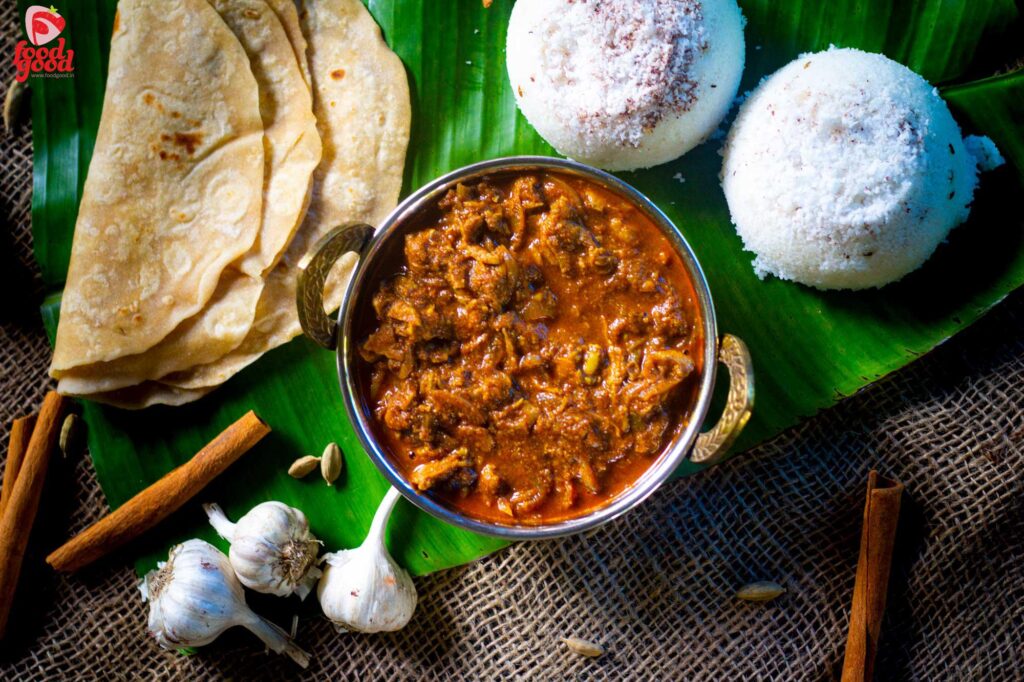There’s a certain honesty in a bowl of nadan boneless chicken curry. No bones to slow you down – just tender pieces of chicken, coated in thick, spiced coconut gravy, each bite full of warmth. It’s the kind of curry that doesn’t try too hard. It doesn’t need to. The smell alone – that roasted coconut, curry leaves, crushed ginger and garlic – is enough to tell you where it came from: home.
I’ve always had a soft spot for boneless versions of traditional dishes. Maybe it’s the ease of eating, or maybe it’s because you can taste the masala better when it wraps every side of the meat. When the gravy is done right – slow-cooked, coaxed into thickness, with just the right punch of pepper – every spoonful is rewarding.
I remember Sunday lunches when this curry would sit at the centre of the table, served with warm choru or flaky porotta. A big steel spoon dipped in, and the smell would fill the whole room. And on the really good days, when there was pal pidi, the match felt almost made for it. The soft dumplings would soak up the gravy, and that bite – soft pidi, rich chicken, a hint of ghee – would just stay with you.
There’s nothing overdone here. The onions are slow browned, the spices bloom in oil, the coconut is roasted just enough – and when everything comes together, it’s not just a curry. It’s the kind of food that makes you pause between bites.
Even now, when I make it, I don’t rush. The chicken needs time to soften, the gravy needs to thicken naturally, and the kitchen needs to fill with that smell – that unmistakable nadan smell that tells you lunch is going to be just right.
Boneless it may be. But what it lacks in bones, it more than makes up in soul.
Nadan Chicken Curry
Ingredients
Instructions
-
Start by marinating the chicken pieces with a little turmeric powder and salt. Let it rest for 10 minutes.
-
Boil the chicken until fully cooked. Save the stock water—we'll use it later. Remove the bones and slice the chicken into small pieces. You’ll need about 2 cups of boneless chicken.
-
Heat 1 teaspoon of coconut oil in a pan. Add 1½ cups grated coconut and roast it on medium flame.
-
Once the coconut starts to brown, add coriander seeds and black pepper. Roast for a few more minutes.
-
When the mixture darkens, add cardamom seeds (just the seeds, not the pods), fennel seeds, cinnamon sticks, and cloves. Roast everything together until the coconut turns deep brown.
-
Turn off the flame and let it cool a bit. Then grind the roasted coconut mix with enough water to make a smooth paste.
-
Heat 1 tablespoon coconut oil in a pan. Add 2 teaspoons crushed ginger and garlic. Sauté until the raw smell disappears.
-
Add sliced onions and sauté until soft. Add green chillies and chopped tomatoes when the onions start to change colour.
-
Once everything is cooked well, add ¼ teaspoon turmeric powder, 1½ teaspoons chilli powder, and 1 teaspoon garam masala. Mix thoroughly.
-
Add the ground coconut paste to the masala and combine well. Don’t forget to add salt to taste.
-
If you want a richer colour, add a little Kashmiri chilli powder. This step is optional.
-
Pour in the reserved chicken stock water. Add more water if needed to adjust the consistency. Let the curry come to a gentle boil.
-
Add the boneless cooked chicken pieces to the gravy. Mix well and simmer for a few minutes so all the flavours blend nicely.
-
Garnish the curry with fresh curry leaves. Give it one last stir.
-
Serve hot with appam, puttu, or pidi.


